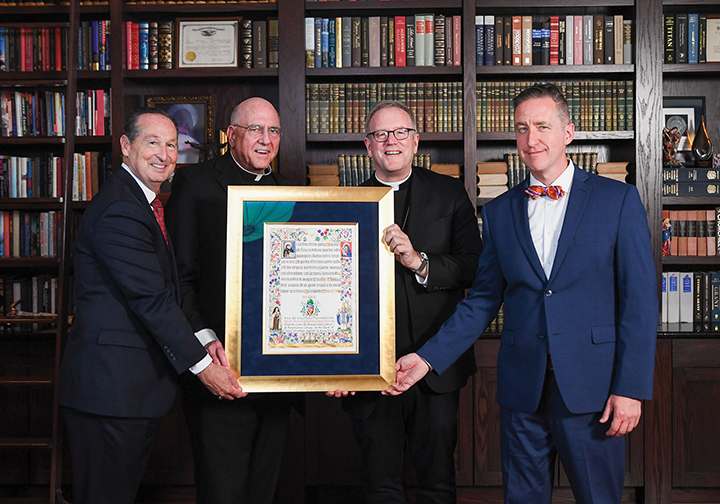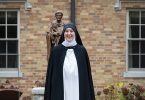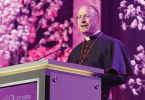
by Steve Johnson
Special to The Leaven
ATCHISON — Bishop Robert Barron, auxiliary bishop of the Archdiocese of Los Angeles and founder of Word on Fire Catholic Ministries, was the recipient of the inaugural Prize for Excellence in Theology and the Arts at Benedictine College in Atchison on May 13. The award, presented by the college’s Center for Beauty and Culture and its director Dr. Denis McNamara, recognized Bishop Barron’s work to express the beauty of Catholic truths.
“It truly is a pleasure for me to award the Center for Beauty and Culture’s very first Prize for Excellence in Theology and the Arts to a great scholar, dedicated priest, loyal churchman and longtime friend, Bishop Robert Barron,” said McNamara in his introduction.
“We see why Bishop Barron and the projects of Word on Fire have been so successful and deserve this award for excellence: Beauty and culture have been central to his mission of evangelization,” said McNamara. “Everything he has done has started with beauty and continued with culture, trying to make the Catholic faith delightful to a world that no longer thinks it needs God.”
McNamara said that one proof of the success of Bishop Barron’s use of beauty in the presentation of the Catholic faith lies in his television mini- series “Catholicism.” That series aired on both EWTN and PBS.
“In other words,” McNamara said, “it was loved by the nation’s committed Catholics and given a hearing by its secular intelligentsia.”
The prize itself is a one-of-a-kind illuminated manuscript page on vellum. Andrew Stewart Jamieson, an artist known for his handcrafted medieval illuminations, painted into the piece direct references to various projects and the personal history of Bishop Barron, including his coat of arms and episcopal motto. For a full explanation of the piece, watch the video on the Benedictine College website at: www.benedictine.edu/prize-for-excellence.

Bishop Barron, who was on the Benedictine College campus as the featured commencement speaker, was impressed by the personal nature and sheer beauty of the award.
“I am grateful beyond words,” said Bishop Barron. “When I said ‘just give me something beautiful,’ I had no idea something like this would emerge. It is a very high honor and it means the world to me.”
He went on to share some personal anecdotes about his calling to the priesthood and how beauty influenced him. He talked about the year he spent at the University of Notre Dame and Dr. Robert Leader, an art professor at the college. The young Barron attended some of his lectures as a freshman and saw that Leader was a big fan of the art of the Middle Ages, especially the old Gothic churches.
“It opened a door in my soul,” Barron said about those lectures. “I never met him (Leader), but he played a decisive role in awakening in me what Dietrich von Hildebrand would call a value response — it’s when something objectively valuable appears.”
He left Notre Dame to go to the seminary and told the story of what happened a few years later when he was on the National Mall in Washington, D.C., and looked at the Capitol building.
“As I’m looking at [the Capitol], I just began to jump up and down,” he said. “When you’re in the presence of something that is beautiful, that is harmonious, it does something to your soul.”
He also told the story from his days as a doctoral student in Paris and his first day when he saw the Cathedral of Notre Dame.
“There was the rose window that I had first seen in Robert Leader’s class when I was 18 years old,” he said. “And now I was seeing it with my own eyes. I didn’t jump up and down, but, boy, it changed me. I must have stayed there for a half-hour.”
He noted that Thomas Aquinas, who had written about beauty, had seen that same window, and it changed him forever.
“The great moment is not when I invent value; who cares what I invent? The great moment is when the objectively good, the objectively true, the objectively beautiful breaks into me and they stop me,” he said. “The beautiful stops you. It then rearranges you. . . . It doesn’t exist on your terms. It rearranges your framework, and it awakens your authentic freedom.”
Bishop Barron said that all these things were graces in his life, and it was all inspired by those lectures from Leader. He said the professor never had any idea that his photographs and talks had such a profound influence on a young freshman sitting in the back of a darkened auditorium.
“Maybe through the work that I do there is some kid sitting somewhere that is influenced by it and finds something compelling and beautiful in the Catholic tradition,” he concluded. “That’s my hope: that the Holy Spirit is doing his work.”






